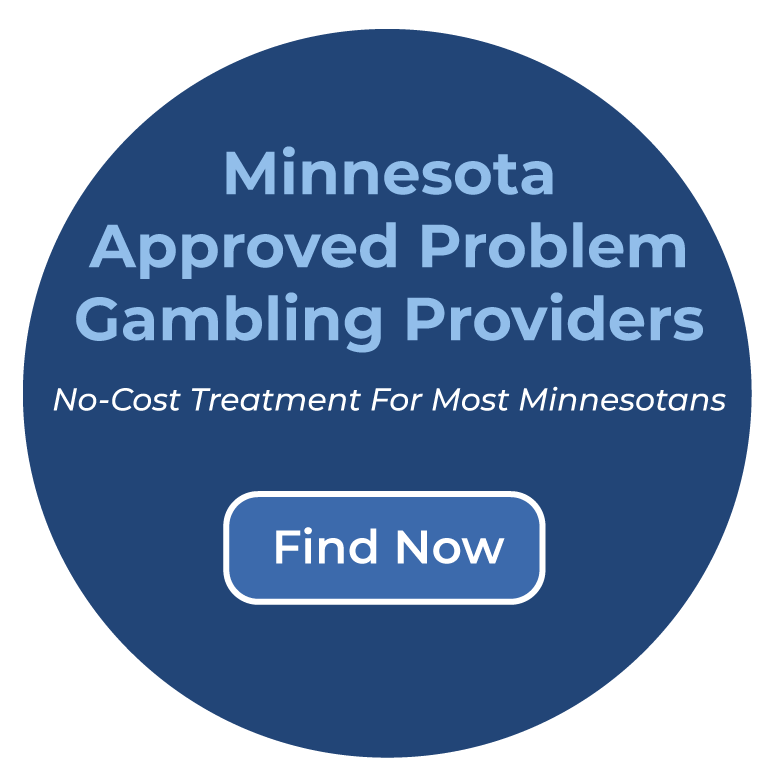PROBLEM GAMBLING
What is Problem Gambling?
Problem gambling, also known as gambling disorder or compulsive gambling, is defined as the uncontrollable urge to gamble despite harmful negative consequences or a desire to stop. It can interfere with a person’s life, relationships and responsibilities.
Virtually anyone – men or women, young or old, and those from every religion, race and socio-economic background – is at risk for developing a gambling problem.
The good news is that help is available and it works!
ARTICLES ABOUT PROBLEM GAMBLING
Counselor Roundtable: What keeps Minnesotans from Seeking Treatment
We asked a variety of gambling counselors about the barriers to getting help. READ MORE
In Their Own Words – Cecila’s Story
“Cecelia” learned some hard lessons about her husband’s gambling. This is her story. READ MORE
SELF-HELP PUBLICATIONS
View, download or order a hard copy below (These are meant to be supplemental guides, not a replacement for therapy)
- Your First Step to Change, 2nd Edition. A self-help toolkit of resources to help start the journey toward recovery from problem gambling behavior.
- Personal Financial Strategies for the Loved Ones of Problem Gamblers
BROCHURES
- Warning Signs of Problem Gambling (English, Spanish, Chinese, Hmong and Vietnamese)
- What Families Can Do When a Loved One has a Gambling Problem (English and Spanish)
- What is Problem Gambling? (English, Somali and Spanish)
- Gambling When in Recovery (English and Spanish)
- Gaming Disorder (English and Spanish)
- Gamban—Block Access to Your Devices (English and Spanish)
- Lower Risk Gambling Guidelines
- Older Adults and Gambling
- Talking to Your Child About Gaming
- Youth and Gambling—What Parents Need to Know
BROCHURES for professionals
- Be Part of the Solution (English and Spanish)
- Why Screen for Gambling Disorder? (English and Spanish)
Newsletter
- Northern Lights - MNAPG Quarterly Newsletter
Interested in receiving copies of our literature?
QUICK FACTS ON PROBLEM GAMBLING
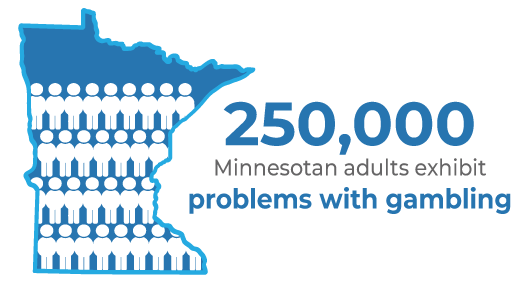
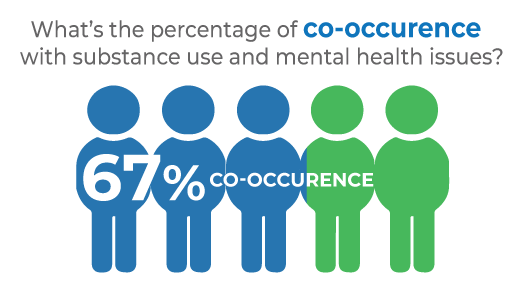
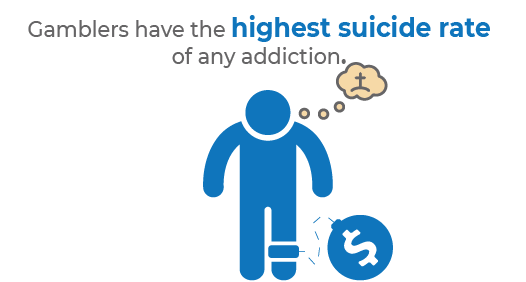
MINNESOTA APPROVED PROVIDERS
Carver County
Resilience Counseling
(612) 750-3376
dahnertmary@icloud.com
1107 Hazeltine Blvd, Suite 410, Chaska, MN 55318
Goodhue County
Midwest Recovery
(651) 846-9010
Info@midwestrecovery.org
midwestrecovery.org
217 Plum Street, Suite #130 Red Wing MN 55066
Hennepin County
Club Recovery Inc
(952) 926-2526
cjohnson@clubrecoveryllc.com
clubrecoveryllc.com
7701 York Ave S, Suite 350, Edina, MN 55435
Connections Counseling & Recovery Services
(763) 370-8880
Joyce Terhorst
joyce.connections@yahoo.com
7550 France Ave S, Suite 220, Edina, MN 55435
Midwest Recovery Inc
(612) 584-4858
info@midwestmn.com
midwestrecovery.org
1620 Central Ave NE, Suite 107, Minneapolis, MN 55413
Problem Gambling Intervention, LLC
(612) 558-5364
Roger Anton
rpanton@juno.com
Minneapolis VA Medical Center, 1 Veterans Drive, Minneapolis, MN 55417
Vinland National Center OP Services
(763) 479-4882
Don Raasch
donr@vinlandcenter.org
vinlandcenter.org
675 NE Stinson Blvd #200, Minneapolis, MN 55413
Itasca County
Lakeview Behavioral Health
218-327-2001
info@lakeviewbh.com
www.lakeviewbh.com
516 S. Pokegama Ave, Grand Rapids, MN 55744
Mille Lacs County
Freedom Center
(763) 308-0006
Cynthia Naumann
maumann.cindi@gmail.com
freedomcenterinc.org
140 2nd Ave NE, Milaca, MN 56353
Olmsted County
Christina Pristash
(507) 202-0701
Christina Pristash
pristashlmft@gmail.com
counselingrochester.org
1500 1st ave NE, Suite 120, Rochester, MN 55906
Ramsey County
Alcohol and Gambling Assessments
(651) 485-6229
Renee Collova-Bergee
reneebergee@comcast.net
1397 Geneva Ave N #102A, Oakdale, MN 55128
Pathways Counseling
(651) 734-5517
Jarrod Brown
jerrodb@pathwayscounselingcenter.org
1919 University Ave W, Suite 6, St Paul, MN 55104
Progressive Individual Resources, Inc.
(612)749-3309
info@pirimn.org
pirimn.org
2147 University Ave W, Suite 206, St Paul, MN 55114
Rice County
Midwest Recovery
651-846-9010
info@midwestrecovery.org
midwestrecovery.org
303 1st Street NE, Suite #365 Faribault, MN 55021
Saint Louis County
Center for Alcohol & Drug Treatment Gambling Services
(218) 723-8444
Paul McCormick
pmccormick@cadt.org
cadt.org
314 West Superior Street Suite 400, Duluth, MN 55802
Sherburne County
Freedom Center
(763) 308-0006
Cynthia Naumann
naumann.cindi@gmail.com
freedomcenterinc.org
105 6th Ave S, Princeton, MN 55371
Washington County
Bridges and Pathways Counseling
(612) 719-7966
Paul Mladnick
mladnick.paul50@gmail.com
1068 S Lake St, Suite 109, Forest Lake, MN 55025
Venthouse Counseling, Jason Walter
(612) 562-6766
Jason Walter LPC, LADC
aadrjay@gmail.com
venthousecounseling.com
8530 Eagle Point Blvd, #100, Lake Elmo, MN 55042
Alcohol and Gambling Assessments
(651) 485-6229
Renee Collova-Bergee
reneebergee@comcast.net
1397 Geneva Ave N #102A, Oakdale, MN 55128
Yellow Medicine County
Project Turnabout/ Vanguard Center for Compulsive Gambling
(320) 564-4911 or 1-800-862-1453
info@projectturnabout.org
projectturnabout.org
660 18th St, Granite Falls, MN 56241
Cass
Soul Solutions
(701) 356-7772
info@soulsolutions.org
soulsolutions.org
1801 38th St S, Fargo, ND 58103
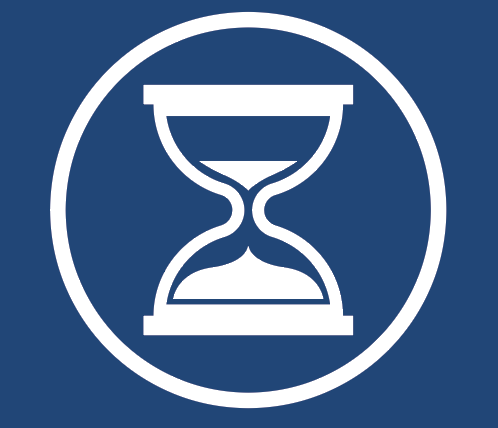
Gambling for longer periods of time than originally planned
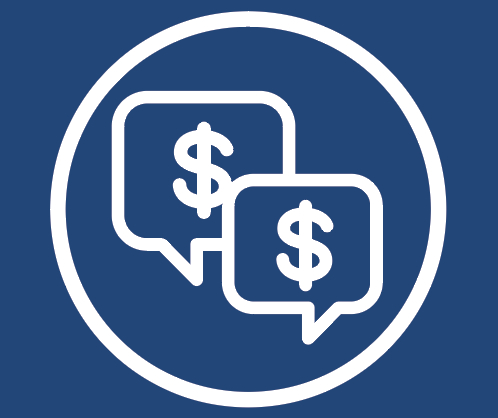
Bragging about wins, but not talking about losses

Increased frequency of gambling activity
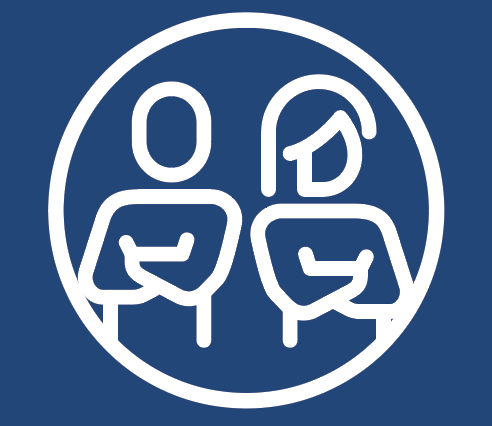
Denying there is a problem
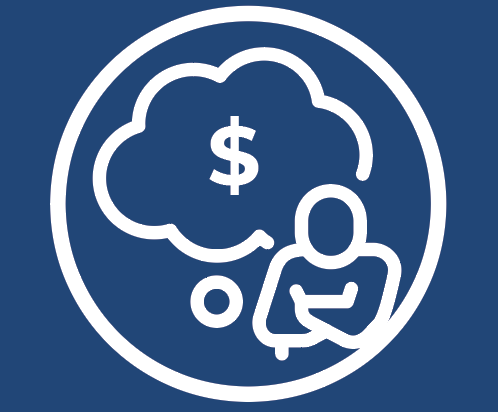
Lying about how money is spent
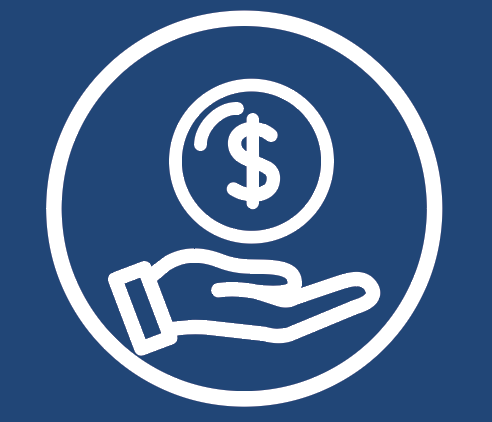
Pressuring others for money when financial problems arise
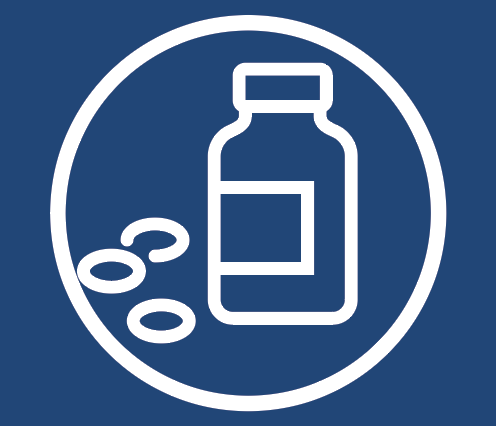
Escaping to other excesses (alcohol, drugs, sleep, video games, etc.)
Understanding Problem Gambling
REDUCING THE STIGMA
Destigmatizing gambling addiction is a key to treating the problem.
We need to reshape how we think about gambling addiction. Here are small acts you can take on your own to help:
- Be compassionate – Show understanding, kindness and support to those suffering from addiction. Withhold judgment, and instead simply listen to their experiences and needs.
- Do your research – Education grows empathy. If you understand what those in the grip of addiction are going through, you can better understand how to help.
- Avoid labels – Words like “addict” or “degenerate” puts blame on the individual. We want to avoid blaming the victim and instead focus on the real problem: the behavior.
- Educate others – Even those with good intentions can cause harm through a lack of knowledge. Share what you learn to help broaden the understanding.
There is a wide range of gamblers — from those who gamble casually for entertainment to those who become addicted. Here some common groupings of gamblers:
- Casual social: Gambles as part of a social outing with others and usually sets time and money limits.
- Professional: Make a living from gambling, often including sports betting, card games or trading stocks. While they spend a lot of time researching and playing, they typically keep their play within their financial, emotional and social limits.
Coping with the negative consequences of gambling addiction can be overwhelming, leading to feelings of shame, guilt and hopelessness.
The National Council on Problem Gambling has reported that about 20% of those diagnosed with gambling disorder attempt suicide – a higher percentage than any other addictive disorder. The families of problem gamblers are also at a higher risk of suicide for many of the same reasons.
- Suicidal thoughts and suicide attempts are much more likely to occur with problem gamblers than with the general population.
- Early onset problem gambling is associated with increased risk of suicide.
- Gambling-related suicide attempts are more likely to be made by older people.
- The risk of suicide in people with gambling problems is increased by comorbid substance use and comorbid mental disorders.
- There is a greater risk of suicide among veteran/active military who have gambling disorders.
If you or someone you know is talking about suicide, call the national helpline number 988, or call the Minnesota Problem Gambling Helpline at 1-800-333-HOPE or text “HOPE” to 53342.
2019 Suicide Fact Sheet from the American Association of Suicidology
- WHAT DO WE MEAN BY GAMBLING HARMS?
- PROBLEM GAMBLING IS A COMMON CO-MORBIDITY
- What Happens to the Brain?
Gambling harms take many forms. For example, the gambler may have hurt him- or herself financially with problems ranging in severity from falling behind on the bills to losing their home or child’s college education fund. Or the gambler may also be suffering psychologically, resulting in issues ranging from anxiety to depression. Problem gambling, when not addressed, often leads to disruption or damage to family, interpersonal or community relationships and causes other negative effects to the person’s physical and mental health and/or their performance in school or at work.
WHY CAN’T THEY JUST STOP?
Those with gambling disorder experience actual changes in the brain as the addiction develops. The repetitive nature of gambling conditions the brain to sustain a level of dopamine that comes from the “high” of gambling. It’s not always a win that provides the rush. Those in recovery have said that even the anticipation of play or a win provided the rush they were seeking. It was more important to keep playing, even if losing. Those who aren’t susceptible to addiction may not understand that the brain is creating the urges to gamble and find it hard to understand why a person simply can’t just stop gambling.
KNOW YOUR FAMILY HISTORY
If there is family history of addiction or mental illness, there is a higher risk to developing addiction, whether it’s gambling or other substances – alcohol, drugs or tobacco. That’s why it’s important for families to have open conversations about family health histories. If depression, anxiety, ADHD or addiction is part of the family history, it’s best for all to know that these are illnesses, not moral failings. Addiction and mental illness can be treated successfully.
In many cases, problem gambling does not occur in isolation. It often occurs in combination with a range of other co-presenting and co-morbid issues, including:
- depression,
- anxiety,
- alcohol and drug issues,
- bad health,
- domestic violence,
- homelessness,
- financial hardship,
- legal problems,
- unemployment, and
- relationship breakdown.
If you or someone you know is being treated for a substance use disorder, be aware that if you gamble or start to gamble it could present an additional challenge in your overall recovery. Many don’t understand that they can have several addictions at once. Gambling has become so normalized that many don’t associate gambling as a possible addiction.
Brain Connections was a project developed in 2015 by a group of Canadian researchers to help those with gambling addiction understand what was happening with their brain in addiction by using common metaphors for easier understanding. In addition to this animated video, there are accompanying handouts.
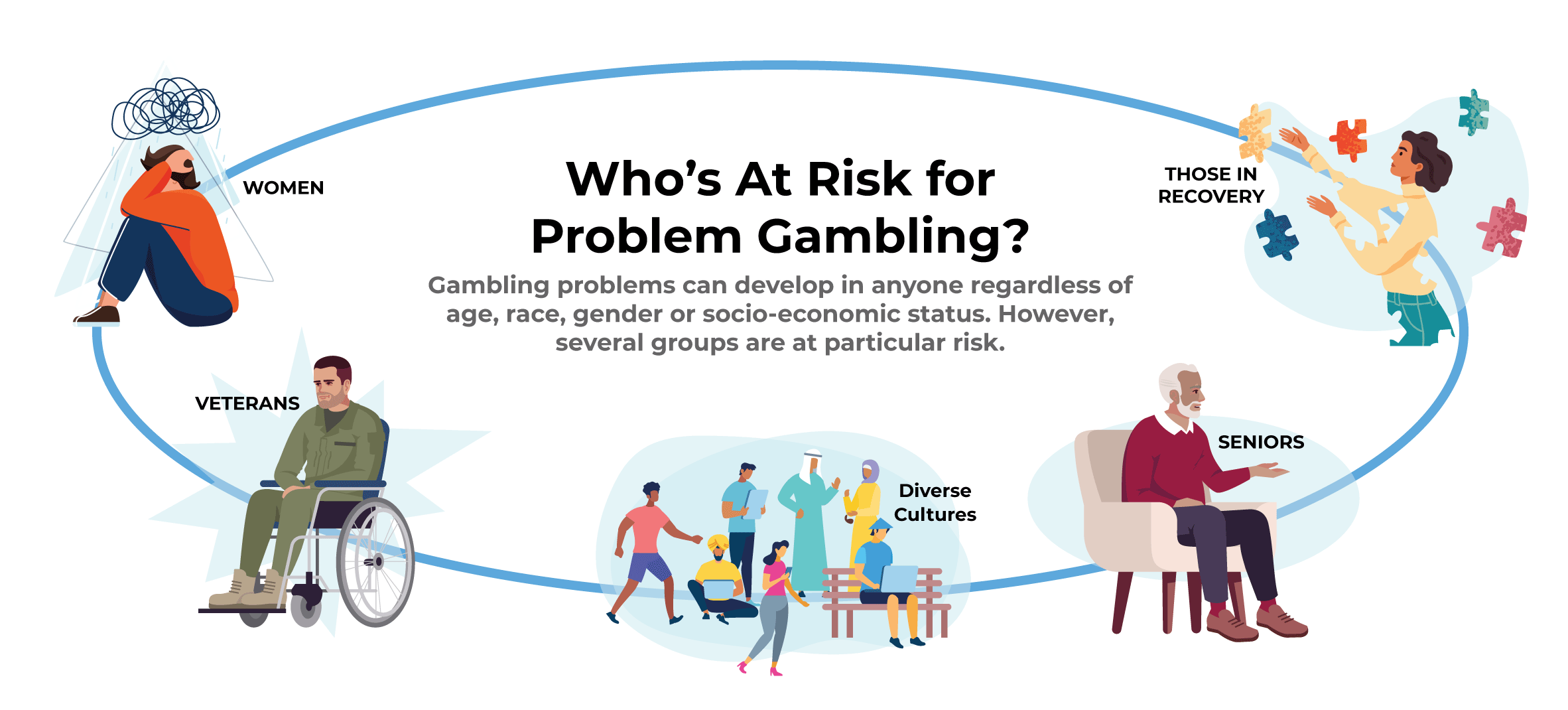
Phases of Problem Gambling
winning PHASE
- It moves beyond occasional gambling when one experiences a large win or frequent wins.
- It’s exciting and the need to gamble more frequently builds and usually is accompanied by increasing the amount of the wagers.
- One fantasizes about winning big and being a big shot.
LOSING PHASE
Remember, gambling is designed for the house to win. As frequency builds, so do the losses. That’s when people start to:
- gamble alone,
- chase losses,
- think only about gambling,
- spend less time with family and friends,
- may start to have some impact on their professional life, and
- start to exhibit some personality shifts – perhaps a bit more restless, irritable or withdrawn.
DESPERATION PHASE
The consequences of gambling disorder are significant and far-reaching. It can affect every aspect of an individual and their family’s lives.
- Financially, those with gambling disorder may find themselves filing for bankruptcy and, in the worst cases, may resort to stealing from others.
- Psychologically and spiritually, they are depleted, depressed and can be suicidal. As their addiction deepens, a problem gambler will withdraw from their normal activities and isolate themselves.
- Families suffer from neglect, abuse, lies and loss of trust and in their vocational setting, work performances can decline or even worse, the loss of a job can dig the individual into a deeper financial hole as they spiral downward.
HOPELESSNESS PHASE
- While the desperation phase is bad, it worsens as the gambler spirals down to the point of hopelessness where all rational thoughts are distorted, and they see no way out of the chaos that is now their life.
- We see increases in divorce, substance use, emotional breakdowns, suicidal ideation and the highest success rate of suicide amongst behavioral addictions.

